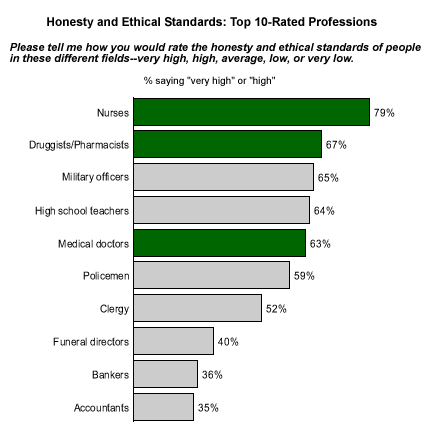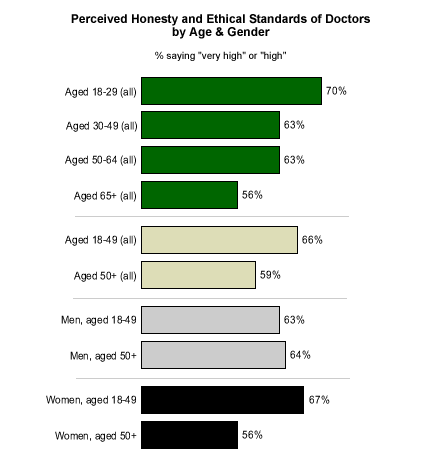As discussed in last week's article on trust and confidence in doctors (see "Americans Rate Confidence in Doctors" in Related Items), more Americans are likely to turn to their doctors for health and medical information -- and have confidence in that information -- than other potential information sources. Three in five Americans (61%) express a great deal of confidence in the health-related information they receive from their doctors, while only 38% express that same level of confidence in information they receive from the nurses at their doctor's office.
But although people are more likely to trust medical information from their doctors than from their nurses, nurses appear to have the upper hand in terms of their perceived honesty and ethical standards. In fact, nurses are consistently one of the highest rated professions in Gallup's annual honesty and ethics poll (see "A Healthy Dose of Honesty" in Related Items), and received the highest rating of any profession measured in Gallup's most recent poll.
Despite the fact that nurses receive a higher rating than doctors, doctors rated far more highly than most other professionals. Yet the ratings of doctors' ethics vary markedly among different age and gender groups. Specifically, younger people are more likely than older individuals -- particularly older women -- to give high ethical ratings to doctors.
Honest Nurses
When Americans were asked to rate the honesty and ethical standards of people in different professions on the November 2002 poll*, 79% gave nurses a rating of "high" or "very high." Although this was the highest rating afforded to any profession, nurse ratings were actually down slightly from November 2001, when 84% rated nurses high or very high.
Druggists/Pharmacists -- another health-related profession -- score just below nurses, with 67% of respondents giving them high or very high ratings. Military officers (65%) and high school teachers (64%) rank third and fourth on the list, and doctors are a close fifth, with 63% rating their honesty and ethical standards high or very high. Doctors are rated highly on this measure by three times as many people as building contractors (20%), four times as many as stockbrokers (12%), and 12 times as many as telemarketers (5%), the lowest rated profession on the list.

Older Women Least Impressed With Doctors
When examining perceptions of nurses and pharmacists, there is little difference between ratings from older and younger patients. When evaluating doctors, however, younger people are far more likely to give higher ethical ratings than are older people. Among those aged 18 to 29, 70% give doctors high ethics ratings (including 21% who give a very high rating); that number is just 56% among people aged 65 and older (and includes only 5% who rate their ethics as very high).
Gender also appears to play a significant role in the lower ratings of doctors compared to other medical professionals. Men over and under the age of 50 do not differ notably in their ethical ratings of doctors. Younger and older women, however, vary significantly. Two-thirds (67%) of women under the age of 50 give high or very high ratings to doctors, compared to just 56% of women aged 50 or older.

Key Points
Americans give medical professionals high ratings in terms of ethics and honesty. Nurses come out on top, followed by pharmacists, and trailed by doctors -- all of which rank in the top five among all professions Gallup measured.
Yet doctors in particular seem to face an interesting challenge with regard to the way they are perceived by women over the age of 50. Older women are far less likely than younger women to give high honesty and ethics ratings to doctors, and also appear to be somewhat less likely to give high ratings than both younger and older men. The reasons for this variation may stem from differing expectations of doctors on the part of older women, or the differing types of medical care that women in this age group require. Regardless of the source of the difference, however, it is clear that doctors may need to devote extra effort to gaining the trust of their older female patients.
*These results are based on telephone interviews with a randomly selected national sample of 1,017 adults, aged 18 and older, conducted Nov. 22-24, 2002. For results based on this sample, one can say with 95% confidence that the maximum error attributable to sampling and other random effects is ±3%. In addition to sampling error, question wording and practical difficulties in conducting surveys can introduce error or bias into the findings of public opinion polls.